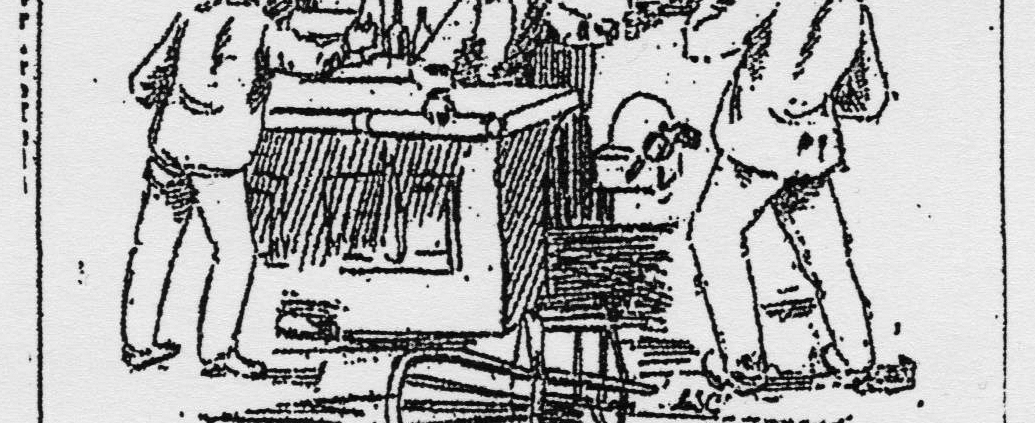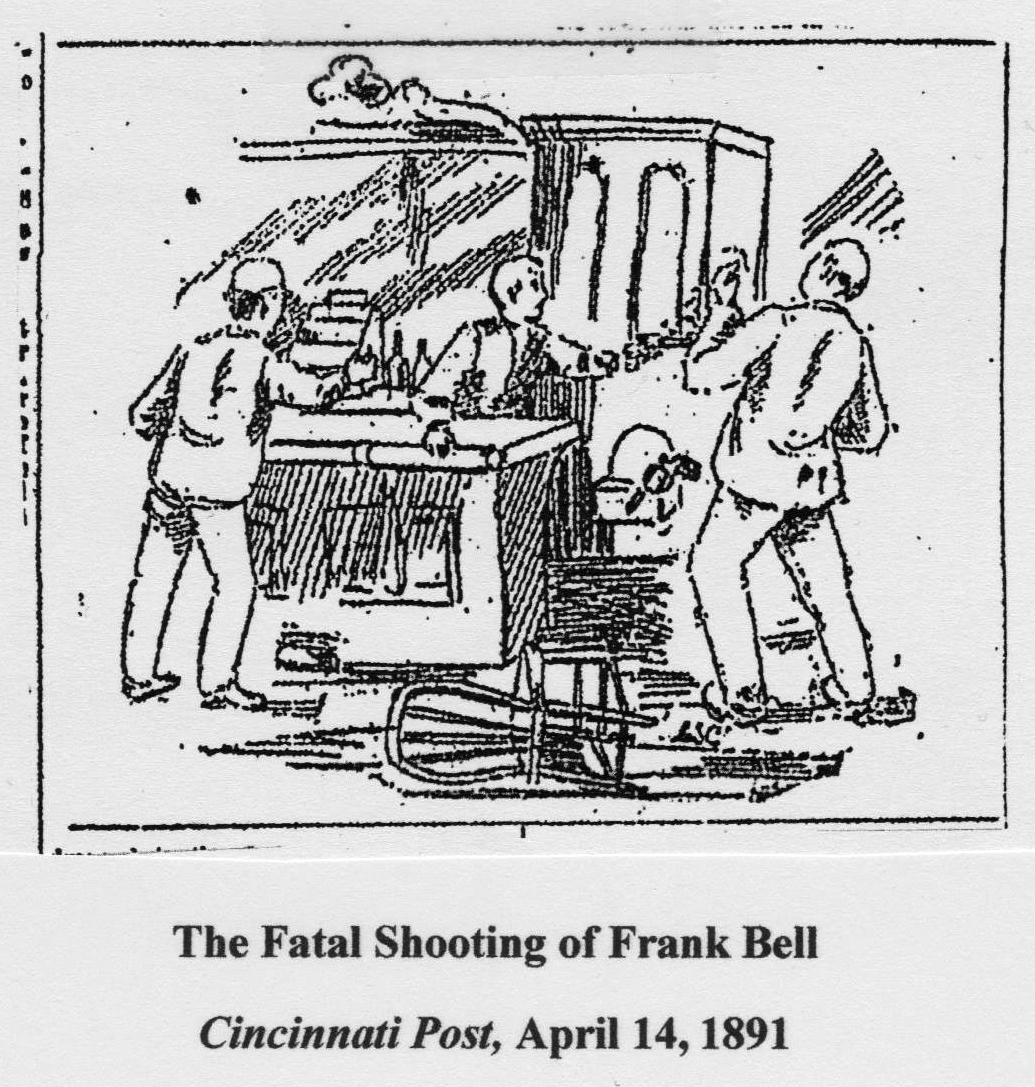Frank Bell
The older brother of a similarly short-tenured major leaguer, Frank Bell was a 10-game catcher/utilityman for the 1885 Brooklyn Grays of the American Association. Bell was out of baseball several years after his brief big-league audition and working in security when his life came to an abrupt end at age 28. He was fatally shot during a fracas at a Cincinnati saloon, thereby achieving the dubious distinction of being, arguably, the first major-league ballplayer to become a homicide victim.1
Our unfortunate subject was born Frank Gustav Bell in Cincinnati on December 11, 1862. He was the second of six children born to horse dealer Louis Bell (1835-1917) and his wife, Sarah (nee Hinkley, 1840-1912), both Ohio natives.2 Little is known of Frank’s early life, but by age 17 he was employed by a local carriage-making factory.3 How Bell got his start in baseball is another unknown. But Cincinnati, home of the renowned undefeated Reds of 1869, was a hotbed of the early game and host to a multitude of sandlot, amateur, and semipro nines.
A muscular 6-footer, Bell played for various local clubs during his free time, but which side he batted and threw from are more unknowns. He entered the professional ranks in 1883, signing with the Grand Rapids (Michigan) club of the minor Northwestern League. His stats for that season are lost, and his playing activities during the following year are also undiscovered. But in 1885, Frank joined the Memphis Browns of the Southern League. In 36 games, he batted a soft .201, with only two extra-base hits, and drew his release in early July.4 He then returned home to Cincinnati, where an unexpected chance to play major-league ball promptly materialized. The Brooklyn Grays of the American Association arrived in town for a series against the Cincinnati Reds and injuries had left the Grays bereft of catchers. Jackie Hayes was laid up with a sprained ankle and Charlie Robinson was suffering from a battered hand.5 In desperate need of a temporary fill-in, Brooklyn manager Charley Byrne settled upon Frank Bell.
Bell made his major-league debut on July 7, 1885, catching ace Brooklyn right-hander Henry Porter. The Grays dropped a 12-7 decision but local recruit Bell “created a great impression, making two hits, one of which was a three-bagger”6 off formidable Reds right-hander Will White. Unhappily for Frank, things rapidly spiraled downward from there. He stopped hitting, registering only one safety in his next eight games. Worse yet was his defensive work. In five appearances behind the plate, he committed six errors, (good for a dismal .739 fielding average) and was charged with 15 passed balls. Still, his luck held for a bit. More Brooklyn player injuries left manager Byrne short of manpower. So Bell was given a two-game trial at third base, where he muffed two of six chances. His outfield performance was better, only one miscue in 12 fielding plays, but his bat remained dormant. Bell concluded his 10-game major-league career, however, with a flourish. On July 31, he went 2-for-4 off righty Ed Knouff in a10-7 loss to the Philadelphia Athletics. He never played another game for Brooklyn, and received his walking papers in early August.7
His final-game hitting raised Bell’s 1885 season batting average to .172 (5-for-29, with one extra-base hit). In 10 games played, he scored five runs for the Grays and drove in two more. Spread over three positions, Frank posted a .780 fielding average, while the Brooklyn club as a whole had logged a 5-13 record during Bell’s time on the roster. Following his release, it was reported that Bell “received good offers for his services from three Southern League teams,”8 but no record of additional 1885 play could be found. His only subsequent mention in newsprint that year arose from a somber occasion: the Cincinnati funeral of Atlanta first baseman Louis Henke, dead from injuries suffered in a Southern League basepath collision. Bell was a pallbearer.9 From there, the biographical trail for Frank Bell becomes sketchy.
Although Bell continued to play minor-league and semipro ball sporadically, his primary endeavor became security work as a “private policeman” or watchman. In May 1887, Cincinnati sportswriter Ren Mulford, Jr. informed readers that “Frank Bell signed with the Akrons [Acorns of the minor Ohio State League], got as far as Columbus, and turned back. He preferred swinging a policeman’s club at the ballpark than playing ball at Akron’s figure.”10 The preference alluded to by Mulford was Bell’s post as a uniformed security guard at League Park, where the formidably-sized and nightstick-equipped ex-catcher posed a visible deterrent to gate-crashing and other unruly behavior by Cincinnati Reds fans.11
Diamond action, however, was not out of Bell’s system. In January 1889 he applied, unsuccessfully, for an umpiring position with the minor-league International Association.12 He had better fortune seeking the post of emergency American Association umpire, and actually called three Reds games that season.13 Frank also resumed playing, briefly forming a sibling battery with younger brother Charlie Bell for the Springfield (Illinois) Senators of the Central Interstate League.14 Before the 1889 season was out, Charlie ascended to the AA Kansas City Cowboys, and would go on to a 13-game career as a big leaguer. Frank, meanwhile, got back into catcher’s harness at least once more, serving as a replacement player in an 1890 preseason exhibition game between Cincinnati Reds “Vets” and “Kids,” and rapping two base hits off the serves of Jesse Duryea.15
During the baseball offseason, Bell served as a pistol-carrying late-night security guard for establishments on Vine Street, Cincinnati’s rough-and-tumble main thoroughfare. The early morning hours of April 14, 1891, found Frank and fellow watchmen Willard Lowenstein and Bob Burns drinking and playing cards at Schoenberg’s Saloon, a neighborhood dive. In time, the card game became Freeze-Out, a poker-type game with different variants, but invariably designed to clean out the stakes of all but the eventual winner. Ultimately, the contestants were reduced to Bell and barkeeper Joseph Hughes. At about 3:30 A.M., Bell tapped out, leaving Hughes to pocket the game’s proceeds. Tragically, the matter did not end there.
Enraged by the outcome, and doubtless fueled by alcohol, the large, muscular Bell — some news reports later described him as a Hercules — attacked the barkeeper “in a savage manner,” kicking at Hughes, throwing a chair at him, and then setting upon the physically-overmatched card game-winner.16 Bystanders briefly separated the pair, but Bell promptly resumed his attack. As he advanced toward Hughes again, Bell reached for the pistol in his coat pocket, or so Hughes later claimed. Thrusting his hand into a saloon sideboard, Hughes produced a handgun of his own and pressed off three quick shots, all of which found their mark. Frank Bell was dead almost before he hit the floor, one of Hughes’ rounds having penetrated his heart.17 Thereafter, Hughes was taken into custody pending official inquiry into the incident.
The following morning, an inquest was conducted by Cincinnati coroner Theodore Bange. Watchmen companions Lowenstein and Burns, as well as saloon waiter Theodore Hecker, all confirmed that Bell had assaulted Hughes once, and was advancing on him again when struck down by the barkeeper’s gunfire. But none of these eyewitnesses had observed Bell reaching for a gun.18 Notwithstanding that, the coroner determined that Hughes’ action had constituted justifiable self-defense, and no further proceedings were conducted against him.
Days later, Bell’s remains were quietly interred in Wesleyan Cemetery, Cincinnati. Never married and without children, Bell’s survivors included his parents and five siblings. The following winter, the proceeds from the annual ball of the Cincinnati Night Owls Club (of which the deceased had been a member in good standing) were dedicated to the erection of a memorial over his grave.19 And to this day, a handsome, if weathered, granite headstone marks the final resting place of long-forgotten ballplayer Frank Bell, a man cut down in his physical prime because he proved unable to abide the outcome of a card game.
Acknowledgments
This biography was reviewed by Len Levin and fact-checked by Alan Cohen.
Sources
Sources for the biographical information recited herein include David Nemec, Major League Baseball Profiles:1871-1900, Volume 2 (Lincoln: University of Nebraska Press, 2011); US Census data and Bell family posts accessed via Ancestry.com; and certain of the newspaper articles cited below. Unless otherwise noted, stats have been taken from Baseball-Reference and Retrosheet.
This bio is adapted from an article on Frank Bell’s death published in Nineteenth Century Notes, Summer 2018.
Notes
1 Certain baseball websites continue to misidentify American Association utilityman Andy Swan (who lived until at least late 1900 and was not a known victim of violence) as major league baseball’s first homicide casualty. Chronologically speaking, Frank Bell’s death in April 1891 makes him the first. But Bell’s death was a homicide only in the legalistic sense, as his slaying was deemed a justifiable act of self-defense by authorities.
2 Frank’s siblings were Mary Ella (born 1859), Harry (1865), Charles (1868), Clarence (1874), and Lewis (1877).
3 As per the 1880 US Census.
4 As reported in Sporting Life, July 8, 1885.
5 As per the New York Herald, July 7, 1885.
6 The assessment of the Cleveland Leader, July 8, 1885.
7 As reported in Sporting Life, August 12, 1885.
8 Sporting Life, August 26, 1885.
9 As reported in the Cincinnati Commercial Tribune, August 19, 1885, and Sporting Life, August 26, 1885.
10 Ren Mulford, Jr., “From Cincinnati,” Sporting Life, May 18, 1887.
11 See Ren Mulford, Jr., “From Cincinnati,” Sporting Life, May 11, 1887.
12 As reported in Sporting Life, January 16, 1889.
13 On April 22 and 23, 1889, Bell was the arbiter for Cincinnati Reds home victories over the Kansas City Cowboys, while July 3 saw him umpire a 2-2 tie game between the Reds and Baltimore Orioles at League Park.
14 As per Nemec, Major League Baseball Profiles, Vol. 2, 389.
15 As reported in Sporting Life, April 5, 1890. Bell was a last-minute replacement for no-show catcher Kid Baldwin. Frank’s Vets defeated the Kids, 7-2.
16 As per “Catcher Bell Murdered,” Sporting Life, April 18, 1891.
17 As per accounts of the incident published in the Austin (Texas) Democrat, Canton (Ohio) Repository, Cincinnati Post, Pittsburg Dispatch, and newspapers reprinting the United Press wire dispatch, April 14-16, 1891.
18 As per the Cincinnati Post, April 15, 1891.
19 As reported in Sporting Life, November 23 and December 19, 1891.
Full Name
Frank Gustav Bell
Born
December 11, 1862 at Cincinnati, OH (USA)
Died
April 14, 1891 at Cincinnati, OH (USA)
If you can help us improve this player’s biography, contact us.



